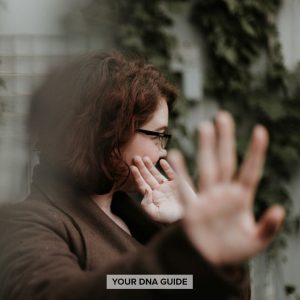Is it possible to disprove someone’s claim of a DNA relationship? Here’s some advice from genetic genealogist Diahan Southard.
 While doing a Legacy Family Tree Webinar series recently, I received the following question from Jim:
While doing a Legacy Family Tree Webinar series recently, I received the following question from Jim:
“I’m trying to learn a little about DNA in self defense. There is a woman who claims that DNA proved that one of my uncles was her father. Having known my uncle and aunt, I find this difficult to accept. How did she use DNA to determine that my uncle was her father? Nobody in the family has taken a DNA test. To me it was just shooting in the dark, especially when he…lived on a farm about 15 miles away and worked 40 hours in a mill in the town where she was born. His wife would not tolerate him staying after work to have a beer with a friend or going to town on a Saturday for a while.”
Before answering Jim’s question, I want to make a couple of key points for those who have been in the DNA testing world for a while already. First, reading Jim’s reaction helps us all to see the effect that a revelation of this kind had on the receiver. Much of the time we think about the person who is searching and how they feel, but it is equally important to consider the effects on the family that is found. Jim is shocked and defensive of his family. We need to recognize that even if we have the best of intentions as testers and we try to ease the delivery of unexpected news, this news will still be a shock. And when delivered over email to a match (or through the family grapevine), it can be even more difficult to understand or believe.
Can you disprove a DNA match?
Now let’s look closely at the question. For the purposes of this conversation, let’s call the DNA tester who is making the claim “Mary.”
Jim says, “Nobody in the family has taken a DNA test.” He could be mistaken; anyone in his wider family circle may have taken a test without his knowledge (like a nephew, a second cousin, etc). That person’s DNA connection to Mary has likely been what has led Mary to this conclusion.
That said, the only way to really prove paternity is for a parent and child to test, or an individual and their full or half sibling. In this case, Mary has said that her father is a specific uncle of Jim’s. Now, if Jim has multiple uncles, and truly none of the uncles or their offspring has tested, there is no way that a single DNA match alone can determine which uncle is the dad. But Mary could conceivably make a strong case for this relationship, based on the DNA she shares with her match(es) to Jim’s family PLUS any family tree research she’s done.
I’m not saying Mary is right or wrong. We don’t have all the facts here. For example, if Mary already knows her mother and can tell that the match is on her dad’s side of the family, and Jim only has one uncle, well, that strengthens Mary’s case. But if Mary doesn’t know her mother, and Jim has more than one aunt or uncle on this side, the case is still wide open as to which aunt or uncle is Mary’s parent.
Even if we do know that Jim only has one uncle, that still doesn’t mean he is the father. It is not totally impossible that there is another explanation. For example, perhaps Jim’s grandparents had another child not known to the family, and that person is Mary’s parent.
Take-home thoughts for unexpected DNA relationship possibilities
For the Marys of our community: this is a good reminder that all possibilities should be considered before approaching a match. Especially before you approach any family member with news that could potentially disrupt their family relationships. You don’t want to make a claim that turns out to be only one of the possible answers.
To Jim and others who have received news they don’t believe through DNA testing….You can see for yourself what your connection to a DNA match may mean by using the proven genetic genealogy techniques laid out in Your DNA Guide—the Book. DNA doesn’t lie—but you usually need at least a little training to interpret what it’s saying. Also, please remember that nobody knows everything about their relatives. It’s always possible that someone had a child that isn’t known to you—heck, a father may even not know that he fathered a child. That event could have happened in the birth parent’s youth or under other circumstances you know nothing about.
Opening ourselves to biological relationship possibilities does not mean we are judging or accusing our relatives—we’re just acknowledging that their lives may have a wider story than we know. Again, even if you verify an unexpected connection yourself, you’ll want to handle it carefully. You don’t want to cause the same kind of response with your loved ones that you yourself felt when hearing the news. Here’s some advice on handling unexpected DNA connections.
Next step: learn for yourself what your DNA is telling you
If you have an ancestor you are trying to discover or confirm, then you need our free guide on finding an ancestor. Download it to start learning what your DNA can tell you about your family.

